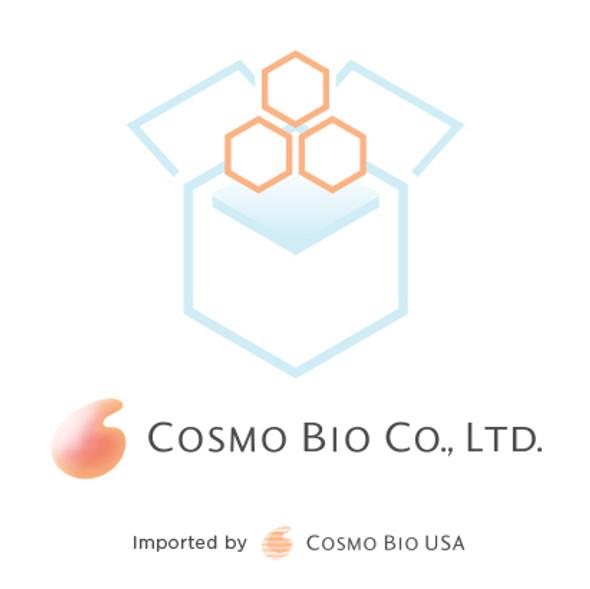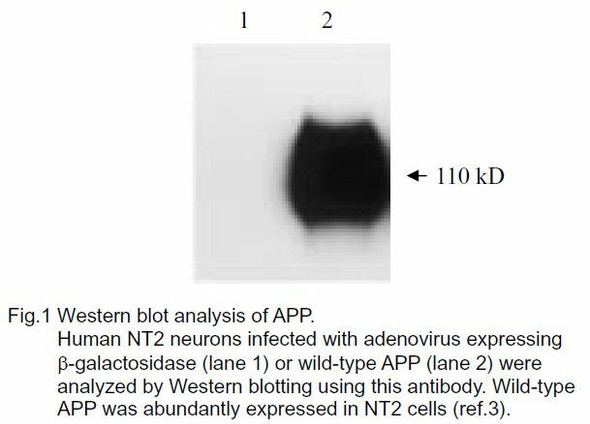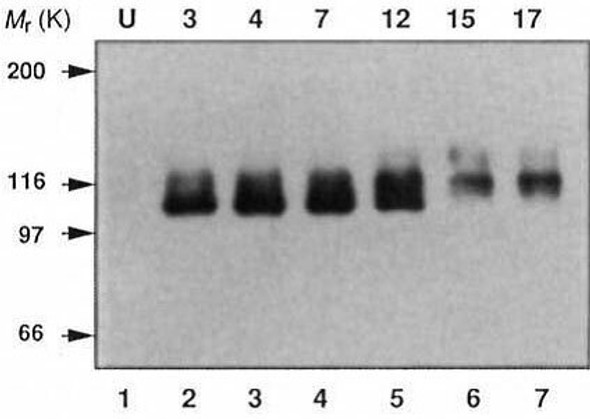Description
Application: IHC, IF, WB
Clonality: Polyclonal
Host: Rabbit
Reactivity: Rat, Mouse, Human
Rabbit polyclonal antibody pT668 recognizes the phosphorylated threonine 668 of Amyloid Protein Precursor (APP) and is suitable for Western Blot, for Immunohistochemistry and Immunofluorescence.
Amyloid Protein Precursor also called APP (Gene ID: 351) is a type 1 transmembrane protein whose metabolism leads to the production of amyloid-beta peptides. In Alzheimer’s disease, amyloid peptides are the main components of amyloid deposits. Amyloid-beta peptides (Ab) are produced following by sequential cleavages of APP by proteases that are named secretases.
The phosphorylation of Anti-APP antibody at threonine 668 (a position corresponding to the APP695 isoform) is increased in Alzheimer’s disease and promotes amyloid-beta peptide production.
APP is phosphorylated at Thr-668 both in vitro and in vivo by a number of kinases including glycogen synthase kinase 3β (GSK3β), Jun N-terminal kinase-3 (JNK3), Jun N-terminal kinase 1 (JNK1), cell division cycle protein (Cdc2), cyclin-dependent kinase 5 (Cdk5) and DYRK1A (Dual-specificity tyrosine(Y)-phosphorylation regulated kinase 1A).
Phosphorylation of APP at Thr-668 results in significant conformational changes and is associated with neurite extension, anterograde transport of vesicular cargo into neurites, axonal transport and in signaling to the nucleus.
4BioDx polyclonal antibodies against APP at phosphorylated Thr-668 (4BDX-1503) are useful tools to detect phosphorylated APP in rat, mice or human brain homogenates by western blot. These antibodies worked greatly in immunohistochemistry and immunofuorescence protocols and they indicated neuritic processes surrounding amyloid deposits (see applications below).
The Anti-APP [pT668] antibody (Ref. 4BDX-1503) recognizes the phosphorylated threonine 668 of Amyloid Protein Precursor (APP). This antibody is a biomarker of neuritic processes surrounding amyloid deposits.
View AllClose
Clonality: Polyclonal
Host: Rabbit
Reactivity: Rat, Mouse, Human
Rabbit polyclonal antibody pT668 recognizes the phosphorylated threonine 668 of Amyloid Protein Precursor (APP) and is suitable for Western Blot, for Immunohistochemistry and Immunofluorescence.
Amyloid Protein Precursor also called APP (Gene ID: 351) is a type 1 transmembrane protein whose metabolism leads to the production of amyloid-beta peptides. In Alzheimer’s disease, amyloid peptides are the main components of amyloid deposits. Amyloid-beta peptides (Ab) are produced following by sequential cleavages of APP by proteases that are named secretases.
The phosphorylation of Anti-APP antibody at threonine 668 (a position corresponding to the APP695 isoform) is increased in Alzheimer’s disease and promotes amyloid-beta peptide production.
APP is phosphorylated at Thr-668 both in vitro and in vivo by a number of kinases including glycogen synthase kinase 3β (GSK3β), Jun N-terminal kinase-3 (JNK3), Jun N-terminal kinase 1 (JNK1), cell division cycle protein (Cdc2), cyclin-dependent kinase 5 (Cdk5) and DYRK1A (Dual-specificity tyrosine(Y)-phosphorylation regulated kinase 1A).
Phosphorylation of APP at Thr-668 results in significant conformational changes and is associated with neurite extension, anterograde transport of vesicular cargo into neurites, axonal transport and in signaling to the nucleus.
4BioDx polyclonal antibodies against APP at phosphorylated Thr-668 (4BDX-1503) are useful tools to detect phosphorylated APP in rat, mice or human brain homogenates by western blot. These antibodies worked greatly in immunohistochemistry and immunofuorescence protocols and they indicated neuritic processes surrounding amyloid deposits (see applications below).
The Anti-APP [pT668] antibody (Ref. 4BDX-1503) recognizes the phosphorylated threonine 668 of Amyloid Protein Precursor (APP). This antibody is a biomarker of neuritic processes surrounding amyloid deposits.

![Anti-APP [pT668] pAb Anti-APP [pT668] pAb](https://cdn11.bigcommerce.com/s-29gjipdr4d/images/stencil/608x608/products/7285/7809/bdx-4bdx-1503_anti-app-pt668-pab_7156__74946.1620916929__28534.1634137975.jpg?c=1)




